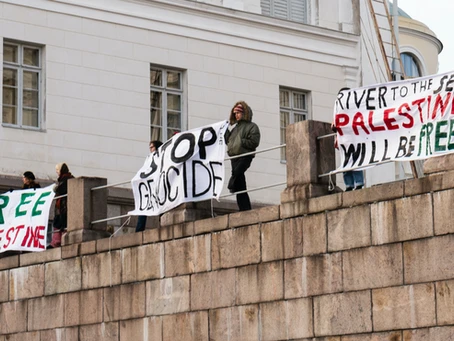Campus activism surrounding the Palestinian-Israeli conflict often presents a skewed narrative, painting Israel as the sole aggressor and magnifying its flaws beyond those of any other nation. While all countries have their shortcomings and deserve scrutiny, Israel stands out as a unique target of widespread university divestment campaigns, suggesting a disproportionate focus on its actions and policies.
Through their rhetoric and demands, anti-Israel divestment campaigns can feed into the demonization of Israel and mischaracterization of Zionism, the movement for the self-determination and statehood for the Jewish people in their ancestral homeland. The measures for which Israel-divestment activists advocate are one-sided and unconstructive, and they fail to promote a better future for Palestinians and Israelis.
Anti-Zionism and BDS
Listen to the slogans and demands of anti-Israel activists, and their beliefs about Israel and Zionism become clear. Divestment campaigns intend to delegitimize Israel’s right to exist and unfairly attempt to hold Israel to a different standard than any other country, including the United States. And yet they fail to condemn the world’s worst sponsors of terror and abusers of human rights.
The movement places the entire onus for the complicated Israeli-Palestinian conflict on Israel alone, and does not support constructive measures to build Israeli-Palestinian engagement or a mutually negotiated two-state solution to the conflict. Indeed, the movement for divestment doesn’t seek a two-state solution; it aims to dismantle the Jewish state.
Israel-divestment activism is the latest iteration of the wider Boycott, Divestment, and Sanctions (BDS) movement that has attempted for years to marginalize and delegitimize Israel. BDS opposes the fundamental building blocks for Israeli-Palestinian understanding, peace-building, and ultimate reconciliation, even at the grassroots level.
ADL believes that many of the founding goals of the BDS movement are antisemitic, given that they effectively reject or ignore the Jewish people’s right of self-determination – and if implemented, would result in the eradication of the world’s only Jewish state. And some BDS advocates and campaigns engage in antisemitic rhetoric.
BDS campaigns can create tensions in communities, particularly on college campuses, potentially leading to the isolation and intimidation of Jewish students and supporters of Israel. The movement’s regressive policy of “anti-normalization” forbids people-to-people exchanges, dialogue opportunities for Israelis and Palestinians, or even interactions between “pro-Israel” and “pro-Palestine” groups and advocates. This applies even to Israeli/pro-Israel groups who support a Gaza ceasefire and are strong advocates for Palestinian rights unless the parties involved first renounce Zionism and declare Israelis to be “oppressors” and “colonizers.”
Rising Antisemitism
The demonization of Zionism and Zionists is particularly frightening and dangerous in this moment of significantly rising levels of antisemitism, and can contribute to conditions where Jews are targeted for their actual or perceived connection to Israel. And it is not just hypothetical: during the Fall semester (from October 7 to the end of 2023), ADL documented a 1,062 percent increase in antisemitic incidents on U.S. university campuses, compared to the same period in 2022.
A U.S. News & World Report survey in April and May found that more than two-thirds of Jewish students at elite U.S. universities say antisemitism is a problem on their campus. Students from universities across the country articulated the plight of many Jewish university students at a House hearing in March. One student at Rutgers University stated “I didn’t come to college to study in a living laboratory of antisemitism, which is what it has become,” adding “Jews at Rutgers are afraid.”
Another student at University of California, Berkeley faced physical and verbal harassment, eventually missing class due to fear of violence. “When you do not call out hate against Jews based on shared ancestral identity, that sends the message to other students on campus that it is okay, socially acceptable, tolerated behavior to actively hate Jews on campus,” she said.
Effective Activism
If campus activists were genuinely committed to uplifting the Palestinian people and helping bring lasting peace to the region, there are more productive avenues than pushing divestment from Israel. Activists could be advocating for their university endowments to become activist shareholders in the companies in which they invest, using their leverage to push those companies to make strategic investments in the Palestinian economy and in peacebuilding initiatives.
But that is not what is happening. Anti-Israel activists’ current approach seems focused on penalizing only one side in a complex, two-sided conflict, placing the entire burden on Israel to create the necessary conditions for peace. This one-sided strategy fails to acknowledge the roles and responsibilities of both parties in resolving the conflict and achieving lasting stability in the region.
JLens publishes this piece in partnership with ADL.




